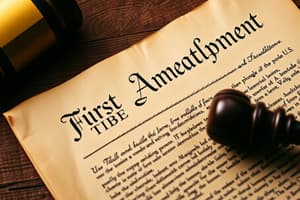Podcast
Questions and Answers
Which Supreme Court ruling established the right to legal counsel for individuals facing criminal charges?
Which Supreme Court ruling established the right to legal counsel for individuals facing criminal charges?
- Roe v. Wade
- Marbury v. Madison
- Dred Scott v. Sandford
- Gideon v. Wainwright (correct)
Which amendment granted citizenship to formerly enslaved people and provided equal protection under the law?
Which amendment granted citizenship to formerly enslaved people and provided equal protection under the law?
- Fourteenth Amendment (correct)
- Fifteenth Amendment
- Twenty-sixth Amendment
- Tenth Amendment
What is the primary purpose of the principle of judicial review as established by Marbury v. Madison?
What is the primary purpose of the principle of judicial review as established by Marbury v. Madison?
- To guarantee the right to legal counsel
- To lower the voting age to 18
- To review the constitutionality of legislative and executive actions (correct)
- To establish equal protection under the law
Flashcards are hidden until you start studying
Study Notes
Polity: Constitutional Law
Constitutional law is the body of rules, doctrines, and practices that govern the operation of political communities, providing the framework for the organization and functioning of governments and ensuring the protection of individual rights and freedoms. In the United States, the Constitution serves as the highest law of the land, and it establishes the structure and functions of the government, as well as the rights and obligations of citizens. This article will explore the key aspects of constitutional law, focusing on the American context.
The Constitution and the Supreme Court
The United States Constitution is the foundation of the country's political and legal system, and it has been interpreted and applied through the work of the Supreme Court. The Court's rulings have shaped the understanding of constitutional law and have played a crucial role in shaping the development of various legal rights and protections.
Some key aspects of the Constitution and its relation to the Supreme Court include:
-
Supremacy: Article VI of the Constitution establishes federal law as dominant over state law, meaning that state laws which directly contradict federal law are not enforceable.
-
Separation of Powers: The Constitution follows a system of enumerated powers and separation of powers between three legislative and judicial branches, designed to check and balance any potential overreach of power by the other branches.
-
Due Process: The Constitution guarantees due process rights, ensuring that individuals are treated fairly and justly by the government.
-
Equal Protection: The Constitution provides equal protection rights, prohibiting discriminatory treatment based on race, gender, or other criteria.
-
Freedom of Speech: The First Amendment protects the right to freedom of speech, allowing individuals to express their opinions and ideas without fear of government interference.
-
Religious Freedom: The First Amendment also protects the right to practice one's religion, ensuring that individuals have the freedom to worship as they choose.
Key Supreme Court Rulings
Supreme Court rulings have played a significant role in shaping the interpretation and application of the Constitution. Some key rulings include:
-
Marbury v. Madison: This case established the principle of judicial review, allowing the Court to review the constitutionality of legislative and executive actions.
-
Dred Scott v. Sandford: This ruling determined that the Constitution did not grant citizenship to African Americans, a decision that was later overturned with the passage of the Thirteenth Amendment.
-
Roe v. Wade: This case established the right to abortion, as protected by the Constitution's privacy clause.
-
Gideon v. Wainwright: This ruling guaranteed the right to legal counsel for individuals facing criminal charges, as protected by the Constitution's due process clause.
Amendments to the Constitution
The Constitution has been amended several times throughout history, reflecting the evolving priorities and values of the American people. Some key amendments include:
-
Fourteenth Amendment: Ratified in 1868, this amendment granted citizenship to formerly enslaved people, provided equal protection under the law, and allowed the federal government to enforce the Constitution's provisions against state governments.
-
Fifteenth Amendment: Ratified in 1965, this amendment prohibited denying the right to vote based on race, color, or previous condition of servitude.
-
Twenty-sixth Amendment: Ratified in 1971, this amendment lowered the voting age to 18, allowing younger Americans to participate in the political process.
Conclusion
Constitutional law is a critical component of the American political and legal system, ensuring the protection of individual rights and freedoms and providing the framework for the organization and functioning of government. The Supreme Court has played a crucial role in interpreting and applying the Constitution, shaping the development of various legal rights and protections. As society evolves, the Constitution and its interpretation through the Supreme Court will continue to play a vital role in shaping the future of American polity.
Studying That Suits You
Use AI to generate personalized quizzes and flashcards to suit your learning preferences.



